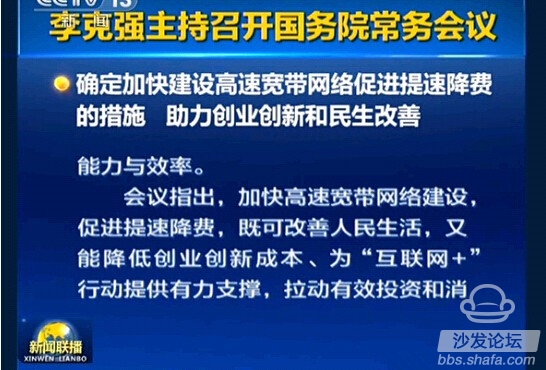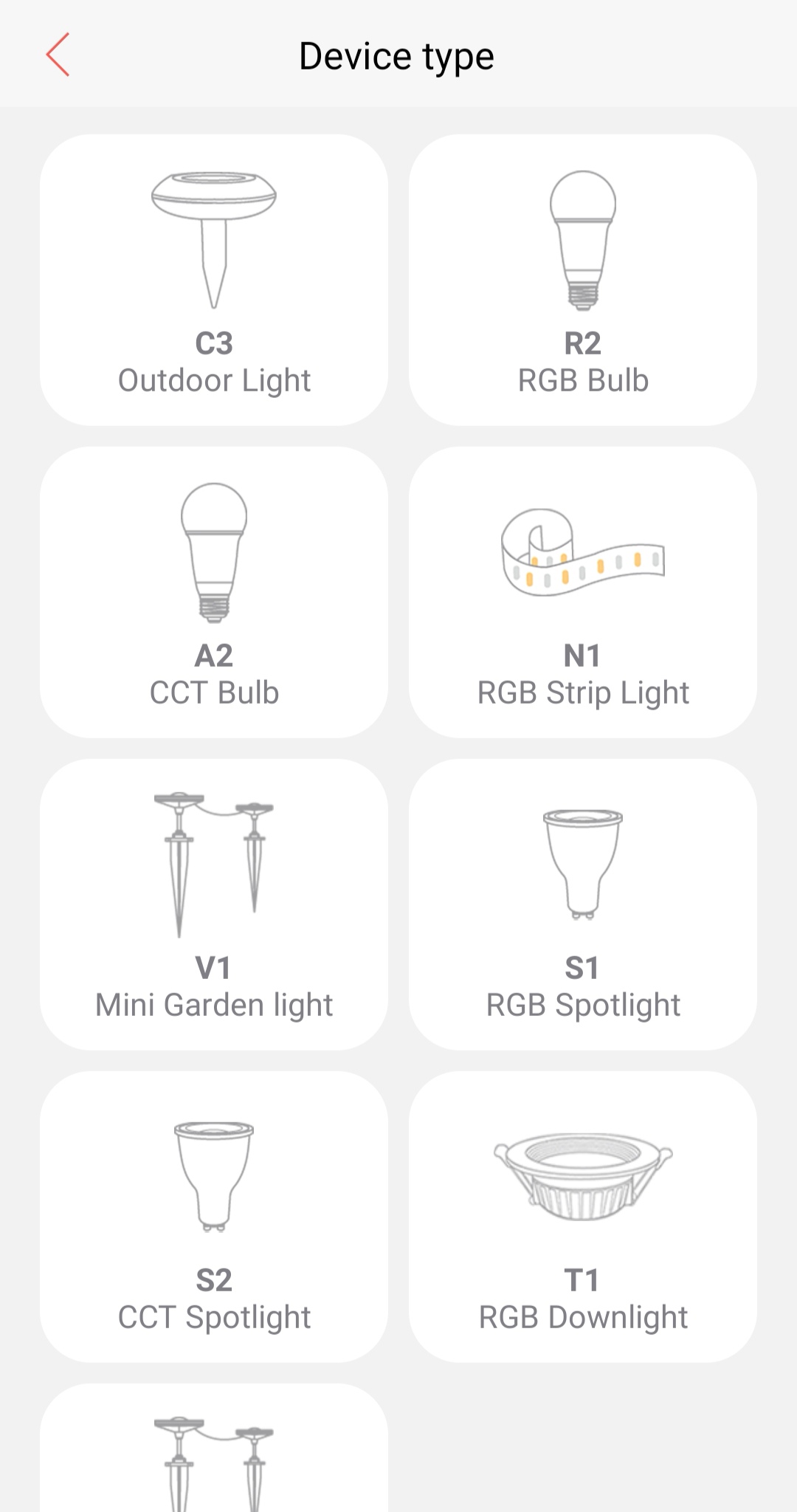On April 14th, Li Keqiang once again talked about the economic situation in the first quarter forum. “China’s backward information infrastructure is hard to imagine, and according to the assessment of the International Telecommunication Union, we are ranked 80th in the world. In the future, we will increase the construction of information infrastructure and increase the network bandwidth. Our potential is very great and the space is also very large.†And at the end of the symposium, Li Keqiang asked relevant departments participating in the meeting to bring in the speeches of these experts and entrepreneurs. Go back and earnestly study! It can be seen that the broadband speed increase and fee reduction project has become a top priority.

China Telecom broadband rose to 4M for free, and the annual fee for the 100M broadband package decreased by 40% : all users under 4 Mbps would all increase to 4Mbps free of charge; the annual fee for the 100M broadband package would be reduced by more than 30%, from 3,000 yuan to below 2,000 yuan . China Telecom will also carry out the “100-megabit speed increase in hundreds of cities†activities, and fully push forward 100-megabit broadband. It is estimated that by the end of 2015, the average access speed of China Telecom's cable broadband will increase from the current 11 Mbps to 20 Mbps, and the unit bandwidth price will drop by about 35%.
China Unicom's 100M broadband 3280 yuan / year dropped to 1980 yuan / year, down nearly 40% : China Unicom intensified efforts to comprehensively promote the transformation of broadband network fiber, in particular, China Unicom will Beijing 20M fixed broadband tariff from 1780 yuan / The annual rate dropped to RMB 1480/year. The 50M tariff dropped from RMB 2680/year to RMB 1780/year, and the 100M tariff dropped from RMB 3280/year to RMB 1980/year.
China Mobile's traffic dropped to 10 yuan and 1GB : China Mobile launched eight measures to reduce network fees and four major projects to increase network speed. It is estimated that by the end of 2015, the comprehensive tariff of traffic will drop by more than 35% year-on-year, and the network capacity and network speed will increase significantly. Among them, 1GB night traffic package price 10 yuan, 1GB holiday traffic package is also as low as 10 yuan, only 0.01 yuan / MB, in addition China Mobile will also fully promote 4G traffic card, 50 yuan with 2GB national traffic, a drop of 50%.
Dr. Peng’s 500M broadband subscription dropped to 1680 yuan per year : Dr. Peng’s annual fee for the 500M optical access package dropped to 1,680 yuan, while the annual fee for the 1,000M broadband package was 1,980 yuan. In addition, at the end of 2017, Gigabit broadband will focus on the development of first- and second-tier cities nationwide, covering second and third-tier cities. In order to reach 100 million home network coverage nationwide, the number of 100M broadband subscribers will exceed 10 million.

In fact, as the key infrastructure for the country’s economic and social development, broadband has long been an important indicator of the overall strength of a country. Many countries in the world regard it as the main driving force for stimulating domestic economic development, and they have all made remarkable achievements. They have strengthened the construction of broadband network infrastructure, comprehensively improved the coverage of broadband networks, access bandwidth capacity, and current speed to nationals. Economically significant.
However, as we all know, domestic broadband network facilities have not been incorporated into urban construction planning as a strategic public infrastructure for economic and social development, such as power grids, water pipes, highways, etc., and broadband construction has not been placed on coal for water and electricity. High levels of traffic and equivalence, coupled with the incompleteness of the market competition, have led to continuing negative events such as broadband market monopolies and fake broadband, which in turn have affected the relatively backward broadband development in Western countries.
According to statistics from the German statistical website Statista, as of the third quarter of 2014, the country with the fastest network speed in the world was South Korea, with an average speed of 25.3 Mbps, which is 5.6 times the world average. Followed by China Hong Kong, Japan, Switzerland, Sweden, the Netherlands, Ireland, Latvia, the Czech Republic, Singapore, China ranks relatively backward. According to another set of data, China's network speed is still in a relatively backward position. According to the report on the development status of the Internet in the fourth quarter of 2014 released by US CDN service provider Akamai, the average speed of the world is 4.5Mbps, and South Korea still uses 22.2Mbps ranked first, Hong Kong and China ranked second and third respectively. It can be seen that the speed and broadband development of South Korea, Hong Kong, Japan and other places are indeed in the leading position, while the speed of the Chinese mainland is 3.4Mbps, ranking 82nd in the world. It is reported that some developing countries have faster Internet speeds than China.
The slow speed of the Internet and the high cost of telecommunications have caused the negative events in the broadband market to be extremely troublesome for Chinese consumers. Because of all kinds of bad broadband phenomenon, consumers have sued the operator to the court. It is also happening from time to time. However, people's concern and discussion, and consumers' rights and interests have not received the attention of telecom operators to the regulatory authorities, and they have not become the driving force for broadband development. In general, domestic supervision and breadth of broadband construction is insufficient.
It is an indisputable fact that the main operators of the broadband market are being “brought into politics†by the two telecom operators and China Unicom’s operators. Although they move into the fixed-line market later, their main focus is still on the development of mobile networks such as 4G. . Monopoly is a key word that triggers a slow network speed and expensive fees.
Introducing market competition to truly break the monopoly can solve the biggest problem in the current broadband development. If we do not change the current number of market players, we will not be able to solve the essential problem of monopoly without opening the market to the greatest degree.
Talking about the subject of market development and the open market, in fact, we cannot deny that since December 25, 2014, the Ministry of Industry and Information Technology has opened up private capital to enter the broadband access market, but so far the private-sector broadband market has remained in the thunder. The sound of rain is small, no big movements. The fact that the market is not open to the outside world is the biggest obstacle to China’s broadband development. "China's network management has different market players, and it is entirely possible to compete and realize small profits and quick sales, and to facilitate businesses and netizens. But these companies have a blood relationship, and they not only lack substantive competition, but they also implement points by dicing. Profit-type monopolization: Under the monopoly, operators of large and small enterprises occupy “source resources†and lack the driving force for service upgrades. In the case of resale, they do not miss out on opportunities,†said some domestic media sources. Without radically resolving the genes of the market players, China’s broadband development has little hope of moving forward. Speeding up price reductions is a matter of fact and it falls short of reality.

This time, the State Council has pointed out this issue and pointed out that Li Keqiang said that “promoting the openness of the telecommunications market and fair competition, the number of pilot enterprises for broadband access services will increase to more than 100 during the year.†This move is a high-profile adjustment for private enterprises entering the broadband market and increasing their names. Introducing the strength and quantity of public funds will undoubtedly bring new development opportunities and business models to the broadband development market. As a result, consumers will have the opportunity to enjoy better services and more affordable services in a more open competitive market. the price of. After all, in any market, there will be development momentum only if there is competition.
The country has set up the market-related policies as early as possible, developed broadband tariffs and network speeds to the level expected by users as soon as possible, and formulated laws and regulations on broadband construction to standardize the order of market development and make it healthy and orderly. “To formulate a series of policy standards and to form a multi-level and multi-level reform mechanism for governments, enterprises and society. On the one hand, we will increase the construction of communication infrastructure, increase the speed of the Internet, reduce tariffs, promote industrial transformation and expand consumption.†The Qingyin monitoring room is so recommended.
Accelerating the speed and reducing fees, speaking to smaller ones, can be more convenient for people's daily life and work quality. To a large extent, broadband construction skills will stimulate domestic demand and stimulate economic growth. According to research conducted by related departments, under the new normal economic conditions, the downward pressure on GDP, the speed of internet, and the level of broadband fees have become an important bottleneck restricting the development of the Internet economy. The improvement of the most basic services such as speed and tariff will only promote the development of the Internet economy, and it will also be beneficial to the overall development of the Chinese economy.
Recently, Premier Li Keqiang has emphasized three consecutive times and emphasized that broadband operators quickly responded by issuing their own speed-up and fee-reduction measures. It can be seen that broadband speed-up and fee-reduction actions are real and the government attaches great importance to the strict implementation of operators. It is crucial to the construction of broadband in China. Since the state has spoken, it is believed that a series of crucial driving forces such as the follow-up of private enterprises, the related departments' investment in the broadband market, regulatory policies, and regulatory laws will be gradually implemented. In short, as the country has increased support for the construction of communication infrastructure, invested funds, formulated relevant policies, encouraged the entry of private capital, opened up markets, and promoted the diversification of competitive models, the series of measures have been implemented, and the speed of China’s broadband network has really accelerated. The ultimate goal of reducing fees is possible.

Smart mini garden spotlight, 9 pcs for 1 kit, two power versions are available, with a driver, adaptor and 10 meters cable. The mini garden spotlight has both lighting and RGB colorful lighting mode, the angel of lamp head can be changed. Lamp body is waterproof IP66, rainproof and dustproof. It can be easily inserted on lawns, gardens and beaches.
The light is power supply, and the 10-meter cable is enough to connect with electric power. Whether it's a cloudy day or a rainy day, you can always light up your garden.
The light color, brightness, cycle mode and timing can be controlled by App.The App are developed on the most advanced Bluetooth Mesh technology. [LinkupHome" App can be downloaded in the App store or Google Player, then you can control our product without any complicated steps. The App is stable, easy control and multifunctional.


The advantages of Bluetooth Mesh are fast connected, low power consumption, no password required and Ad-Hoc Network. No need WIFI and hubs, as long as you have a Bluetooth-enabled smart phone, you can experience the smart light. When you install several smart gardenspots, the self-organizing network function can make the signals free connected, break the limitation of distance.

Plug-in Electric Outdoor Light
Solar Garden Lights,Outdoor Strip Lights For Garden,Garden Outdoor Strip Lights,Plug In Electric Outdoor Light
Ningbo Homey Photoelectric Technology. Co., Ltd , https://www.linkuphome.com